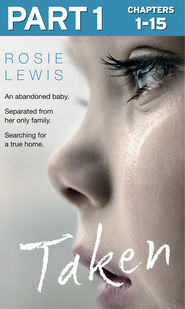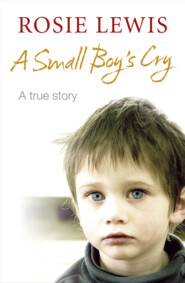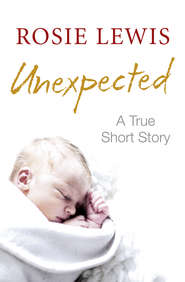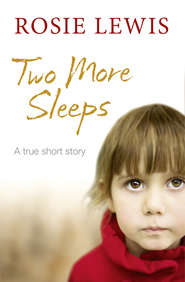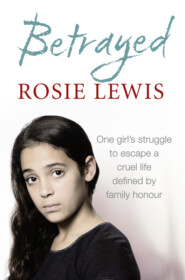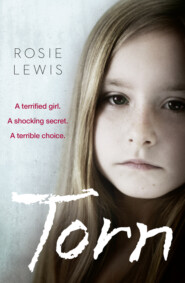По всем вопросам обращайтесь на: info@litportal.ru
(©) 2003-2024.
✖
Broken: A traumatised girl. Her troubled brother. Their shocking secret.
Настройки чтения
Размер шрифта
Высота строк
Поля
I leaned over and opened one of the low cupboards, sensing that she was back, somewhere behind me. I made a thing of rummaging through the bottles of shampoo and tubes of toothpaste. ‘They’re there!’ Bobbi screeched from the doorway. ‘Right there!’
‘Where?’
‘There!’
‘Oh right!’ I pulled them out. ‘Why didn’t you say so?’
She giggled, her eyes settling on the water pistols, ducks and little sail boats in the box I was holding. Relieved, I closed the door behind her.
‘No-o-o-o-o!’ she bellowed, spinning around. ‘I’m going to watch the telly!’
‘I think we have some bubbles here somewhere.’
She let out a growl of fury and banged her fists on the door, pummelling with all her might. Lots of children in the care system struggle with an overwhelming, almost pathological need to be in control. I suddenly thought of Taylor, a ten-year-old girl I had cared for about a decade earlier. The witnessing of severe domestic violence against her mother by her abusive father had left Taylor desperately anxious. She was so badly affected that she wouldn’t even leave school at the end of the afternoon; even when the building was empty and the cleaners had finished doing their rounds. Though frustrated by her behaviour at the time, I came to realise that Taylor was clasping onto the only things in her life that she had any control over, because everything else was falling apart. As the months passed and her trust in me grew, she allowed me to take over the reins and mother her. She’s a grown woman now and sometimes when she writes to me she mentions her ‘sit-ins’. They’re a standing joke between us.
Some people remain convinced that the relatively new diagnoses of pathological demand avoidance (PDA) and oppositional defiance disorder (ODD) are invented labels demanded by ineffectual parents who are simply incapable of providing consistent boundaries. You mean they’re just not doing as they’re told is a common response to any conversation involving PDA and ODD.
When I first started out as a foster carer it was a view I shared as well. Having cared for chronically inflexible children though, I’ve become convinced that trauma, both pre- and post-birth, has a profound impact on the brain. In recent years, scientific evidence involving the use of brain scans has confirmed altered brain functioning in children who have been abused or neglected in early infancy.
‘Hey, come here, sweetie.’ I crawled until I was alongside her then wrapped my arm around her back, holding her close to my side. It was a non-violent resistance (NVR) technique designed to promote a feeling of solidarity rather than confrontation. ‘I know you’re upset about missing out on TV, but if you come and have a bath nicely we can watch some in the morning, okay?’
Naming a child’s feelings sometimes helps to take the sting out of their tantrum, but with Bobbi it only seemed to fan the flames. With a roar of fury she shook her arms loose. ‘I WANT TELLY NOW!’ she screeched, ramming home the message by whacking me on the top of my head.
I couldn’t help but cry out and she stilled, watching me intently. Her eyes shone and her lips twitched. So much for solidarity, I thought.
‘Kind hands, Bobbi,’ I warned, but she lashed out again, catching my cheek with one of her nails. Her survival mechanism had kicked in again; the ancient safety net that programmes us to react to perceived threat in a fight, flight or freeze mode. This little girl, it seemed, was going to fight.
I felt a flare of annoyance but I swallowed it down. There was no sense in matching her anger with my own – trying to regulate a child’s emotions while in a dis-regulated state was like ironing clothes using a pack of frozen peas – it was never going to work. I cuddled her close, fending off her blows with my arms.
It took a while, but slowly she relaxed, her small body slumping against mine. She allowed me to undress her without further complaint and what followed was the quickest bath I had ever supervised. Her eyelids grew heavy afterwards, when I wrapped her in a warm towel, but when I switched on the hairdryer to dry the damp ends of her shoulder-length hair, she flew into alert, her eyes goggling with distress. I did my best to towel dry it and tucked her into bed, passing her the soft rabbit she had taken to earlier. ‘Where’s Mummy?’ she asked suddenly, her chin wobbling.
‘She’s at home, sweetie. You’ll see her soon.’
She blinked as I covered her with the duvet, then rolled onto her side and closed her eyes. As I stroked some blonde strands behind her ears, I noticed for the first time the picture she had drawn earlier, now stuck on the wall between the bunks. I felt a prickle of unease. It was a childish drawing of several men and women, but what unsettled me were the angry expressions on their faces and the private parts drawn in graphic detail between their legs.
Chapter Four (#u0a4d892e-db9d-5747-96fe-08829501e9c2)
‘Do I have to go to bed now?’ asked Archie when I walked into the living room five minutes later. He was sitting on the sofa, Mungo resting contentedly at his feet. A few feet away the credits of You’ve Been Framed were rolling across the television screen.
‘What time do you usually go to bed on a school night?’ I asked distractedly, still unsettled by the sight of Bobbi’s drawings. Mungo nuzzled my hand as I joined Archie on the sofa. I stroked his head and gave myself a mental shake. It was perfectly possible that the drawings were entirely innocuous. Children with older siblings often demonstrated behaviour that was beyond their years.
Jumping to conclusions was one of the pitfalls of fostering that I tried to avoid. Like social workers, when foster carers ratchet up lots of experience it’s easy to make assumptions. ‘Oh, I forgot to ask earlier, Archie. Which school do you go to?’
There was a pause and then he said: ‘I don’t go to school.’
I frowned at him. ‘Oh. You’re home schooled then?’
‘Mostly,’ he muttered, his eyes downcast. I had found a single navy-blue jumper in his case with the letters ‘MP’ embroidered onto it. A quick Google search had offered a couple of possibilities, but if Archie were to be believed, he wasn’t registered with either of them.
‘Not to worry. I’ll speak to your social worker about it.’ A strange expression crossed his face and I wondered whether I had a school refuser on my hands. He ruffled his fringe and rearranged his features, quickly recovering.
‘So what time do you usually go to bed on a week night?’
‘Between about eight and half past. Mum lets me read in bed though.’
‘Oh, you like reading, do you?’ It seemed that my strategy for encouraging reluctant readers – allowing them an extra half an hour downstairs after their scheduled bedtime if they read with us – wouldn’t be needed for Archie.
He nodded. ‘I’ve just got into Harry Potter. I finished Philosopher’s Stone a few weeks ago. I can’t wait to read Chamber of Secrets.’
I stood up and walked to the bookshelf in the corner of the room. ‘I have a pack of Harry Potter playing cards here somewhere. Fancy a game now?’
‘Really? Yes please!’ His voice bubbled with excitement. It struck me as the first genuine reaction I’d seen since he’d arrived.
His fingers trembled when he took the pack from me. He fanned through the cards, exclaiming every time he spotted a different character. ‘Who’s your favourite? Mine’s Professor McGonagall, I think, though I love that ghost as well; the one with the funny voice.’
‘Moaning Myrtle!’ he cried, flicking through the deck until he found a card featuring Professor McGonagall. He held it up for me to see, his eyes alight. ‘Why do you like her best?’
I took the card from him and looked at it. ‘Because she’s fierce, but in a good way. She’s one of those people you’d love to have on your side when you’re in a fix. You know the type: firm but fair. How about you?’
He flicked through the cards again. ‘I like Harry and Ron,’ he said, ‘but Mrs Weasley is my favourite.’
‘Oh yes, I like her too.’ I felt a rush of affection for him. Being one of the most sympathetic and cuddly characters in the Harry Potter series, the archetypal mum, there was no need to ask why she was the one who appealed to him most.
‘You remind me a bit of her,’ he added shyly, his eyes fixed on the deck of cards in his hand.
I chuckled. ‘Well, thank you. At least, I think it’s a compliment!’ He grinned, fully meeting my eye for the first time since we’d met.
Despite never having played before, he picked up the game of Rummy quickly enough, beating me on his second round. ‘Are you sure you’ve never played this before?’
He grinned as I dealt another hand. ‘I don’t suppose you got a chance to pack much of your stuff before going to Joan’s, did you?’ I hadn’t seen what was in his rucksack, but there certainly hadn’t been any personal items in his suitcase when I’d unpacked it. Bobbi hadn’t brought any toys with her either.
‘No.’ He picked up a card from the deck on the sofa between us, looked at it, then placed it on the discard pile, straightening it until it was exactly in line with the rest. ‘The police packed a bag for us and then one of the social workers went to our house and grabbed some more of our clothes. She dropped it at Joan’s and said we should ask our social worker if we wanted anything else.’
‘And do you know who your social worker is?’ It was likely that the children would be allocated a different social worker now that they were looked-after children, rather than children in need.
‘I think his name began with a D, but I can’t remember. He came to see us at Joan’s but I forgot to ask about my stuff.’
I nodded, picking up another card from the deck. ‘I can arrange for someone to collect some bits if you tell me what you’d like.’
He bunched his lips together. ‘It doesn’t matter.’
‘How about some books? I mean, we have lots here, but if you were in the middle of reading one …’
He shook his head. ‘Mum was going to get Chamber of Secrets for me but Jason said reading’s for wimps.’
I peered at him over the top of my cards. ‘Oh, really? Is Jason your mum’s partner?’ I usually tried to employ a mild tone whenever a child told me anything about their parents, so as not to deter them from opening up about their home lives. On this occasion, though, surprise got the better of me.
He nodded. ‘He says –’ he started to say, then seemed to think better of it and gave a little shrug.






